A Comprehensive Study: Distinctiveness of Simmel's Sociology
VerifiedAdded on 2023/01/18
|11
|3461
|53
Essay
AI Summary
This essay delves into the distinctiveness of Georg Simmel's sociological contributions, highlighting his influence as a pioneer in the field. It examines his key works, including his theories on sociability, the interplay of forms and content, and his analysis of modernity. The essay explores Simmel's perspectives on money, fashion, and the impact of metropolitan life on individuals. It discusses his micro approach to sociology, his focus on everyday interactions, and his contributions to understanding social structures. The essay provides a comprehensive overview of Simmel's key concepts and their enduring relevance to sociological thought.
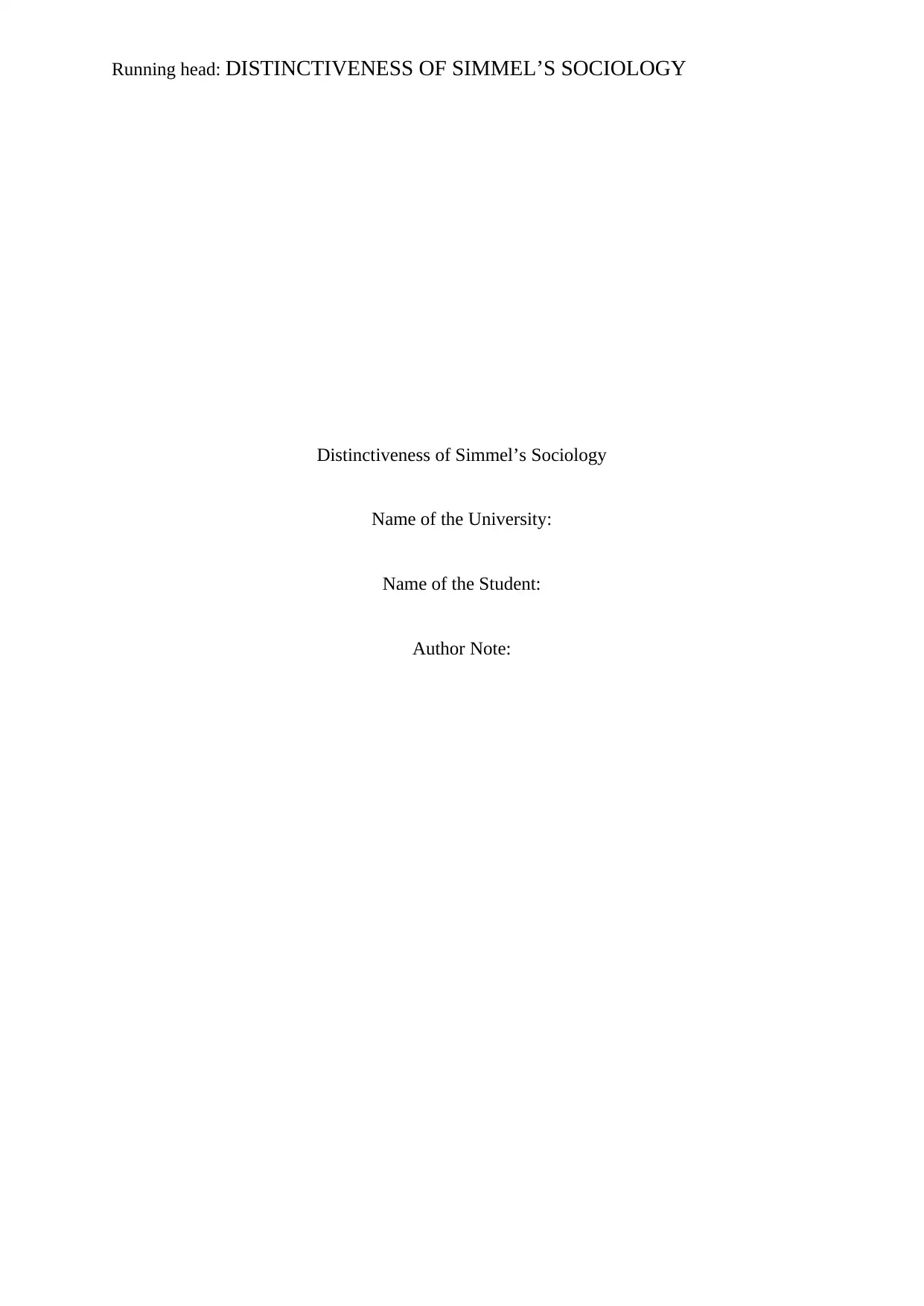
Running head: DISTINCTIVENESS OF SIMMEL’S SOCIOLOGY
Distinctiveness of Simmel’s Sociology
Name of the University:
Name of the Student:
Author Note:
Distinctiveness of Simmel’s Sociology
Name of the University:
Name of the Student:
Author Note:
Paraphrase This Document
Need a fresh take? Get an instant paraphrase of this document with our AI Paraphraser
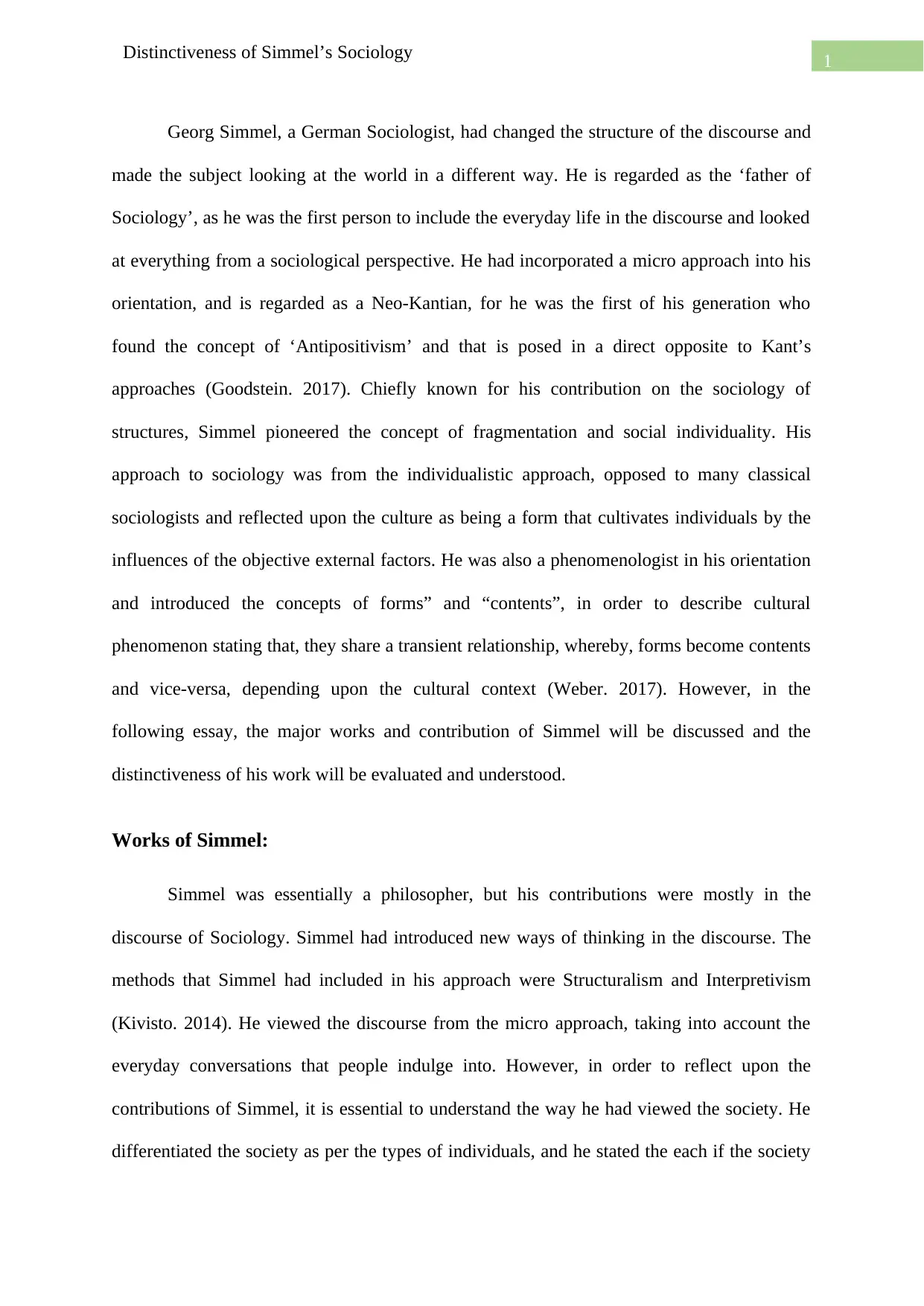
1Distinctiveness of Simmel’s Sociology
Georg Simmel, a German Sociologist, had changed the structure of the discourse and
made the subject looking at the world in a different way. He is regarded as the ‘father of
Sociology’, as he was the first person to include the everyday life in the discourse and looked
at everything from a sociological perspective. He had incorporated a micro approach into his
orientation, and is regarded as a Neo-Kantian, for he was the first of his generation who
found the concept of ‘Antipositivism’ and that is posed in a direct opposite to Kant’s
approaches (Goodstein. 2017). Chiefly known for his contribution on the sociology of
structures, Simmel pioneered the concept of fragmentation and social individuality. His
approach to sociology was from the individualistic approach, opposed to many classical
sociologists and reflected upon the culture as being a form that cultivates individuals by the
influences of the objective external factors. He was also a phenomenologist in his orientation
and introduced the concepts of forms” and “contents”, in order to describe cultural
phenomenon stating that, they share a transient relationship, whereby, forms become contents
and vice-versa, depending upon the cultural context (Weber. 2017). However, in the
following essay, the major works and contribution of Simmel will be discussed and the
distinctiveness of his work will be evaluated and understood.
Works of Simmel:
Simmel was essentially a philosopher, but his contributions were mostly in the
discourse of Sociology. Simmel had introduced new ways of thinking in the discourse. The
methods that Simmel had included in his approach were Structuralism and Interpretivism
(Kivisto. 2014). He viewed the discourse from the micro approach, taking into account the
everyday conversations that people indulge into. However, in order to reflect upon the
contributions of Simmel, it is essential to understand the way he had viewed the society. He
differentiated the society as per the types of individuals, and he stated the each if the society
Georg Simmel, a German Sociologist, had changed the structure of the discourse and
made the subject looking at the world in a different way. He is regarded as the ‘father of
Sociology’, as he was the first person to include the everyday life in the discourse and looked
at everything from a sociological perspective. He had incorporated a micro approach into his
orientation, and is regarded as a Neo-Kantian, for he was the first of his generation who
found the concept of ‘Antipositivism’ and that is posed in a direct opposite to Kant’s
approaches (Goodstein. 2017). Chiefly known for his contribution on the sociology of
structures, Simmel pioneered the concept of fragmentation and social individuality. His
approach to sociology was from the individualistic approach, opposed to many classical
sociologists and reflected upon the culture as being a form that cultivates individuals by the
influences of the objective external factors. He was also a phenomenologist in his orientation
and introduced the concepts of forms” and “contents”, in order to describe cultural
phenomenon stating that, they share a transient relationship, whereby, forms become contents
and vice-versa, depending upon the cultural context (Weber. 2017). However, in the
following essay, the major works and contribution of Simmel will be discussed and the
distinctiveness of his work will be evaluated and understood.
Works of Simmel:
Simmel was essentially a philosopher, but his contributions were mostly in the
discourse of Sociology. Simmel had introduced new ways of thinking in the discourse. The
methods that Simmel had included in his approach were Structuralism and Interpretivism
(Kivisto. 2014). He viewed the discourse from the micro approach, taking into account the
everyday conversations that people indulge into. However, in order to reflect upon the
contributions of Simmel, it is essential to understand the way he had viewed the society. He
differentiated the society as per the types of individuals, and he stated the each if the society
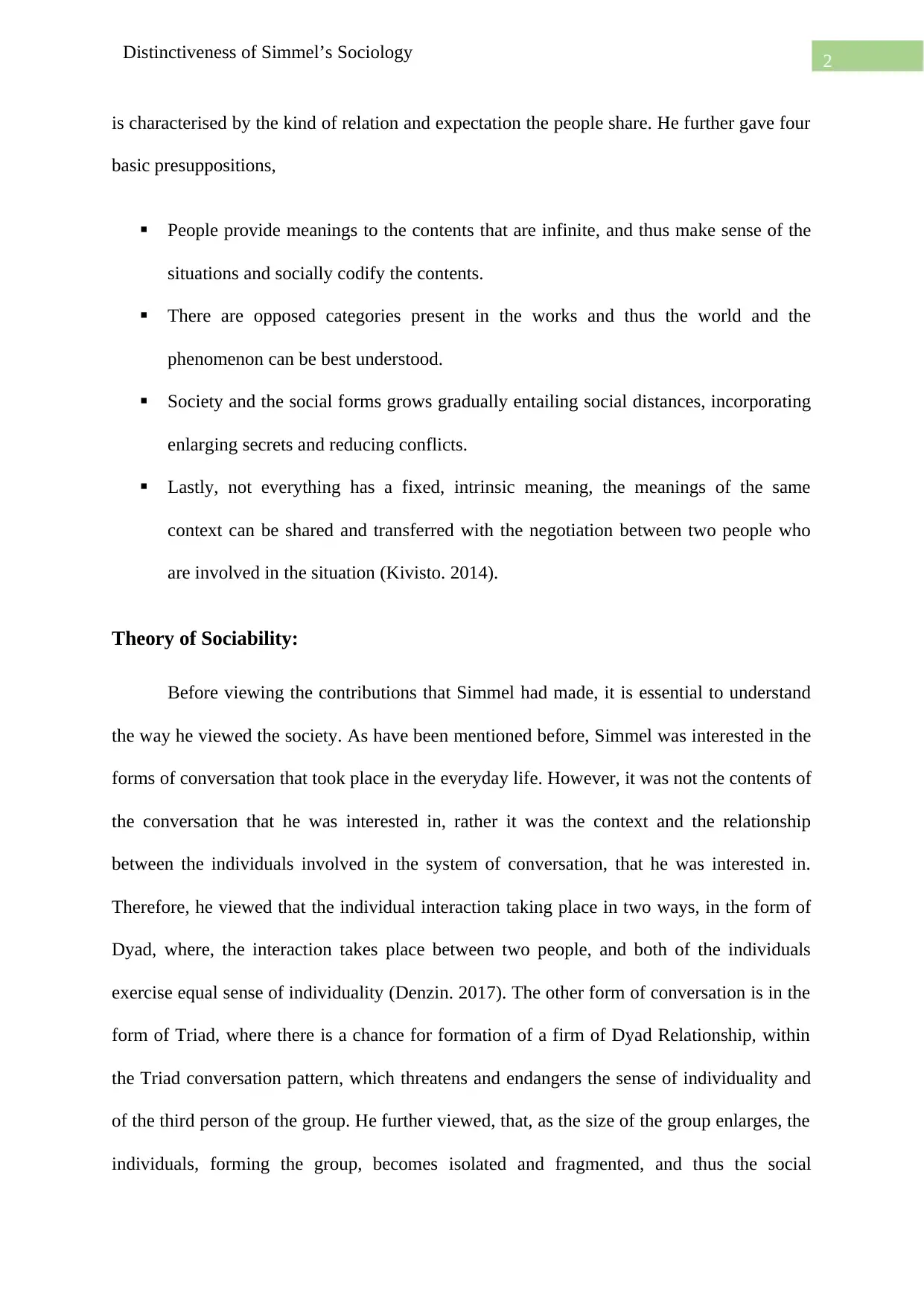
2Distinctiveness of Simmel’s Sociology
is characterised by the kind of relation and expectation the people share. He further gave four
basic presuppositions,
People provide meanings to the contents that are infinite, and thus make sense of the
situations and socially codify the contents.
There are opposed categories present in the works and thus the world and the
phenomenon can be best understood.
Society and the social forms grows gradually entailing social distances, incorporating
enlarging secrets and reducing conflicts.
Lastly, not everything has a fixed, intrinsic meaning, the meanings of the same
context can be shared and transferred with the negotiation between two people who
are involved in the situation (Kivisto. 2014).
Theory of Sociability:
Before viewing the contributions that Simmel had made, it is essential to understand
the way he viewed the society. As have been mentioned before, Simmel was interested in the
forms of conversation that took place in the everyday life. However, it was not the contents of
the conversation that he was interested in, rather it was the context and the relationship
between the individuals involved in the system of conversation, that he was interested in.
Therefore, he viewed that the individual interaction taking place in two ways, in the form of
Dyad, where, the interaction takes place between two people, and both of the individuals
exercise equal sense of individuality (Denzin. 2017). The other form of conversation is in the
form of Triad, where there is a chance for formation of a firm of Dyad Relationship, within
the Triad conversation pattern, which threatens and endangers the sense of individuality and
of the third person of the group. He further viewed, that, as the size of the group enlarges, the
individuals, forming the group, becomes isolated and fragmented, and thus the social
is characterised by the kind of relation and expectation the people share. He further gave four
basic presuppositions,
People provide meanings to the contents that are infinite, and thus make sense of the
situations and socially codify the contents.
There are opposed categories present in the works and thus the world and the
phenomenon can be best understood.
Society and the social forms grows gradually entailing social distances, incorporating
enlarging secrets and reducing conflicts.
Lastly, not everything has a fixed, intrinsic meaning, the meanings of the same
context can be shared and transferred with the negotiation between two people who
are involved in the situation (Kivisto. 2014).
Theory of Sociability:
Before viewing the contributions that Simmel had made, it is essential to understand
the way he viewed the society. As have been mentioned before, Simmel was interested in the
forms of conversation that took place in the everyday life. However, it was not the contents of
the conversation that he was interested in, rather it was the context and the relationship
between the individuals involved in the system of conversation, that he was interested in.
Therefore, he viewed that the individual interaction taking place in two ways, in the form of
Dyad, where, the interaction takes place between two people, and both of the individuals
exercise equal sense of individuality (Denzin. 2017). The other form of conversation is in the
form of Triad, where there is a chance for formation of a firm of Dyad Relationship, within
the Triad conversation pattern, which threatens and endangers the sense of individuality and
of the third person of the group. He further viewed, that, as the size of the group enlarges, the
individuals, forming the group, becomes isolated and fragmented, and thus the social
⊘ This is a preview!⊘
Do you want full access?
Subscribe today to unlock all pages.

Trusted by 1+ million students worldwide
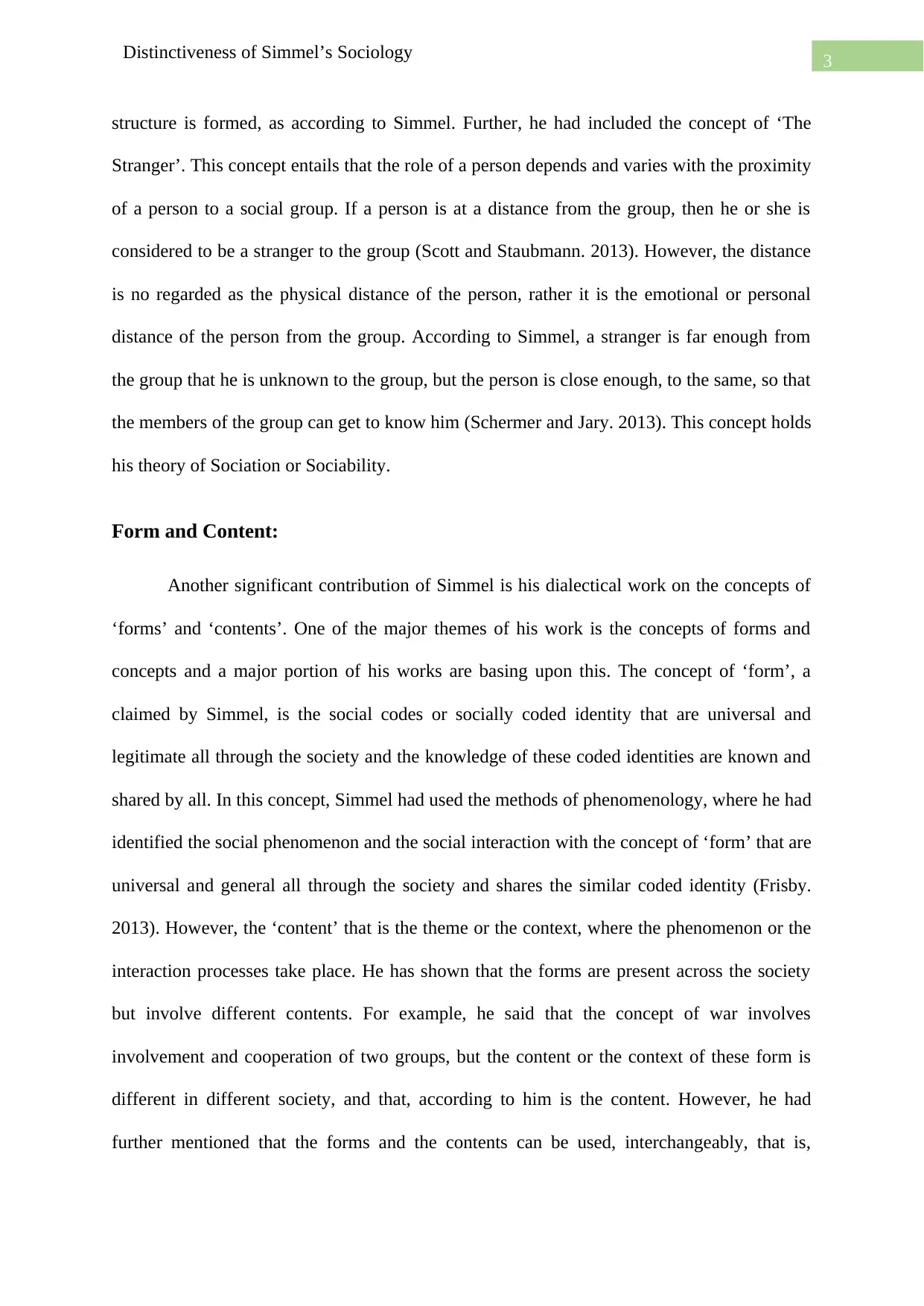
3Distinctiveness of Simmel’s Sociology
structure is formed, as according to Simmel. Further, he had included the concept of ‘The
Stranger’. This concept entails that the role of a person depends and varies with the proximity
of a person to a social group. If a person is at a distance from the group, then he or she is
considered to be a stranger to the group (Scott and Staubmann. 2013). However, the distance
is no regarded as the physical distance of the person, rather it is the emotional or personal
distance of the person from the group. According to Simmel, a stranger is far enough from
the group that he is unknown to the group, but the person is close enough, to the same, so that
the members of the group can get to know him (Schermer and Jary. 2013). This concept holds
his theory of Sociation or Sociability.
Form and Content:
Another significant contribution of Simmel is his dialectical work on the concepts of
‘forms’ and ‘contents’. One of the major themes of his work is the concepts of forms and
concepts and a major portion of his works are basing upon this. The concept of ‘form’, a
claimed by Simmel, is the social codes or socially coded identity that are universal and
legitimate all through the society and the knowledge of these coded identities are known and
shared by all. In this concept, Simmel had used the methods of phenomenology, where he had
identified the social phenomenon and the social interaction with the concept of ‘form’ that are
universal and general all through the society and shares the similar coded identity (Frisby.
2013). However, the ‘content’ that is the theme or the context, where the phenomenon or the
interaction processes take place. He has shown that the forms are present across the society
but involve different contents. For example, he said that the concept of war involves
involvement and cooperation of two groups, but the content or the context of these form is
different in different society, and that, according to him is the content. However, he had
further mentioned that the forms and the contents can be used, interchangeably, that is,
structure is formed, as according to Simmel. Further, he had included the concept of ‘The
Stranger’. This concept entails that the role of a person depends and varies with the proximity
of a person to a social group. If a person is at a distance from the group, then he or she is
considered to be a stranger to the group (Scott and Staubmann. 2013). However, the distance
is no regarded as the physical distance of the person, rather it is the emotional or personal
distance of the person from the group. According to Simmel, a stranger is far enough from
the group that he is unknown to the group, but the person is close enough, to the same, so that
the members of the group can get to know him (Schermer and Jary. 2013). This concept holds
his theory of Sociation or Sociability.
Form and Content:
Another significant contribution of Simmel is his dialectical work on the concepts of
‘forms’ and ‘contents’. One of the major themes of his work is the concepts of forms and
concepts and a major portion of his works are basing upon this. The concept of ‘form’, a
claimed by Simmel, is the social codes or socially coded identity that are universal and
legitimate all through the society and the knowledge of these coded identities are known and
shared by all. In this concept, Simmel had used the methods of phenomenology, where he had
identified the social phenomenon and the social interaction with the concept of ‘form’ that are
universal and general all through the society and shares the similar coded identity (Frisby.
2013). However, the ‘content’ that is the theme or the context, where the phenomenon or the
interaction processes take place. He has shown that the forms are present across the society
but involve different contents. For example, he said that the concept of war involves
involvement and cooperation of two groups, but the content or the context of these form is
different in different society, and that, according to him is the content. However, he had
further mentioned that the forms and the contents can be used, interchangeably, that is,
Paraphrase This Document
Need a fresh take? Get an instant paraphrase of this document with our AI Paraphraser
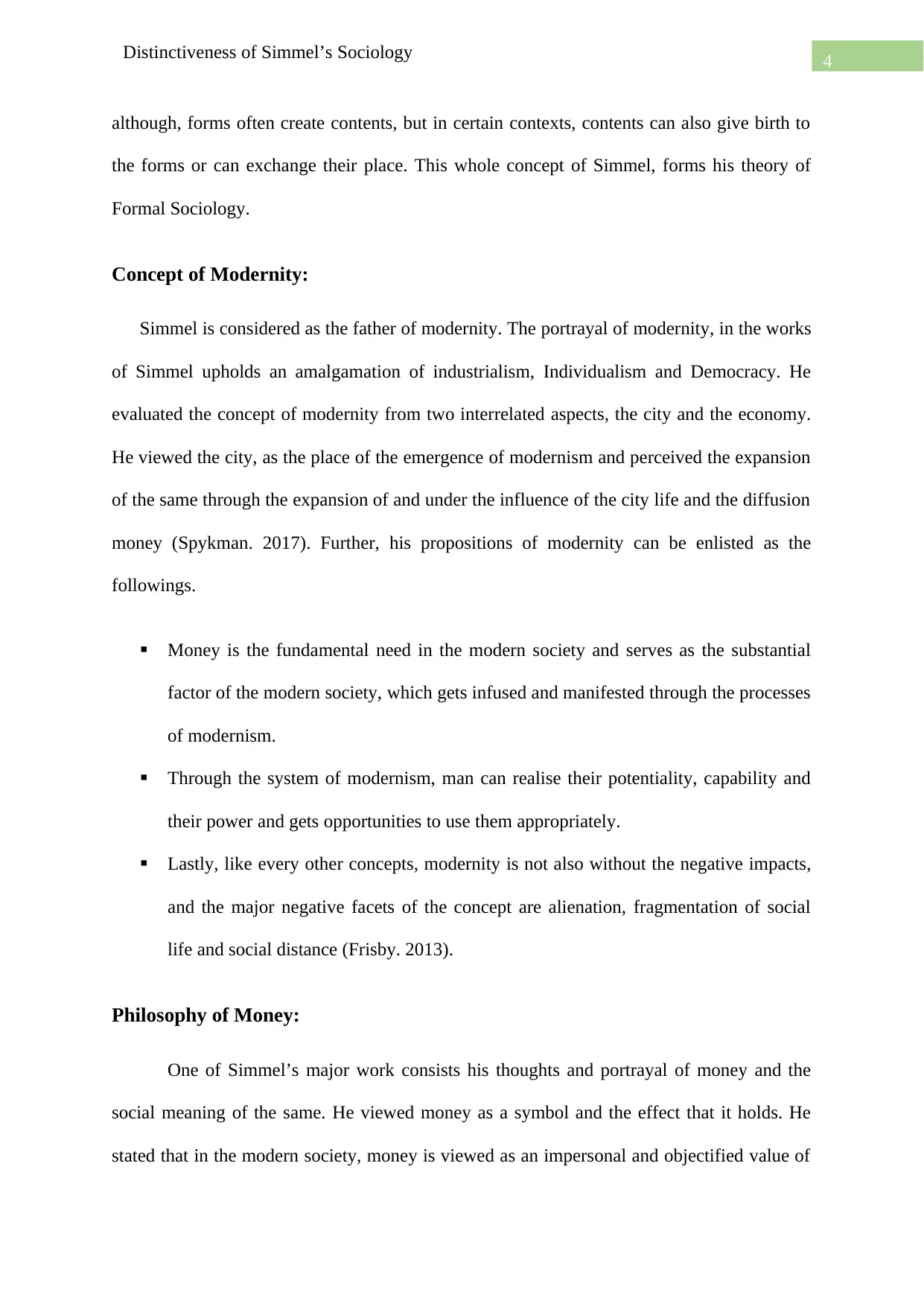
4Distinctiveness of Simmel’s Sociology
although, forms often create contents, but in certain contexts, contents can also give birth to
the forms or can exchange their place. This whole concept of Simmel, forms his theory of
Formal Sociology.
Concept of Modernity:
Simmel is considered as the father of modernity. The portrayal of modernity, in the works
of Simmel upholds an amalgamation of industrialism, Individualism and Democracy. He
evaluated the concept of modernity from two interrelated aspects, the city and the economy.
He viewed the city, as the place of the emergence of modernism and perceived the expansion
of the same through the expansion of and under the influence of the city life and the diffusion
money (Spykman. 2017). Further, his propositions of modernity can be enlisted as the
followings.
Money is the fundamental need in the modern society and serves as the substantial
factor of the modern society, which gets infused and manifested through the processes
of modernism.
Through the system of modernism, man can realise their potentiality, capability and
their power and gets opportunities to use them appropriately.
Lastly, like every other concepts, modernity is not also without the negative impacts,
and the major negative facets of the concept are alienation, fragmentation of social
life and social distance (Frisby. 2013).
Philosophy of Money:
One of Simmel’s major work consists his thoughts and portrayal of money and the
social meaning of the same. He viewed money as a symbol and the effect that it holds. He
stated that in the modern society, money is viewed as an impersonal and objectified value of
although, forms often create contents, but in certain contexts, contents can also give birth to
the forms or can exchange their place. This whole concept of Simmel, forms his theory of
Formal Sociology.
Concept of Modernity:
Simmel is considered as the father of modernity. The portrayal of modernity, in the works
of Simmel upholds an amalgamation of industrialism, Individualism and Democracy. He
evaluated the concept of modernity from two interrelated aspects, the city and the economy.
He viewed the city, as the place of the emergence of modernism and perceived the expansion
of the same through the expansion of and under the influence of the city life and the diffusion
money (Spykman. 2017). Further, his propositions of modernity can be enlisted as the
followings.
Money is the fundamental need in the modern society and serves as the substantial
factor of the modern society, which gets infused and manifested through the processes
of modernism.
Through the system of modernism, man can realise their potentiality, capability and
their power and gets opportunities to use them appropriately.
Lastly, like every other concepts, modernity is not also without the negative impacts,
and the major negative facets of the concept are alienation, fragmentation of social
life and social distance (Frisby. 2013).
Philosophy of Money:
One of Simmel’s major work consists his thoughts and portrayal of money and the
social meaning of the same. He viewed money as a symbol and the effect that it holds. He
stated that in the modern society, money is viewed as an impersonal and objectified value of
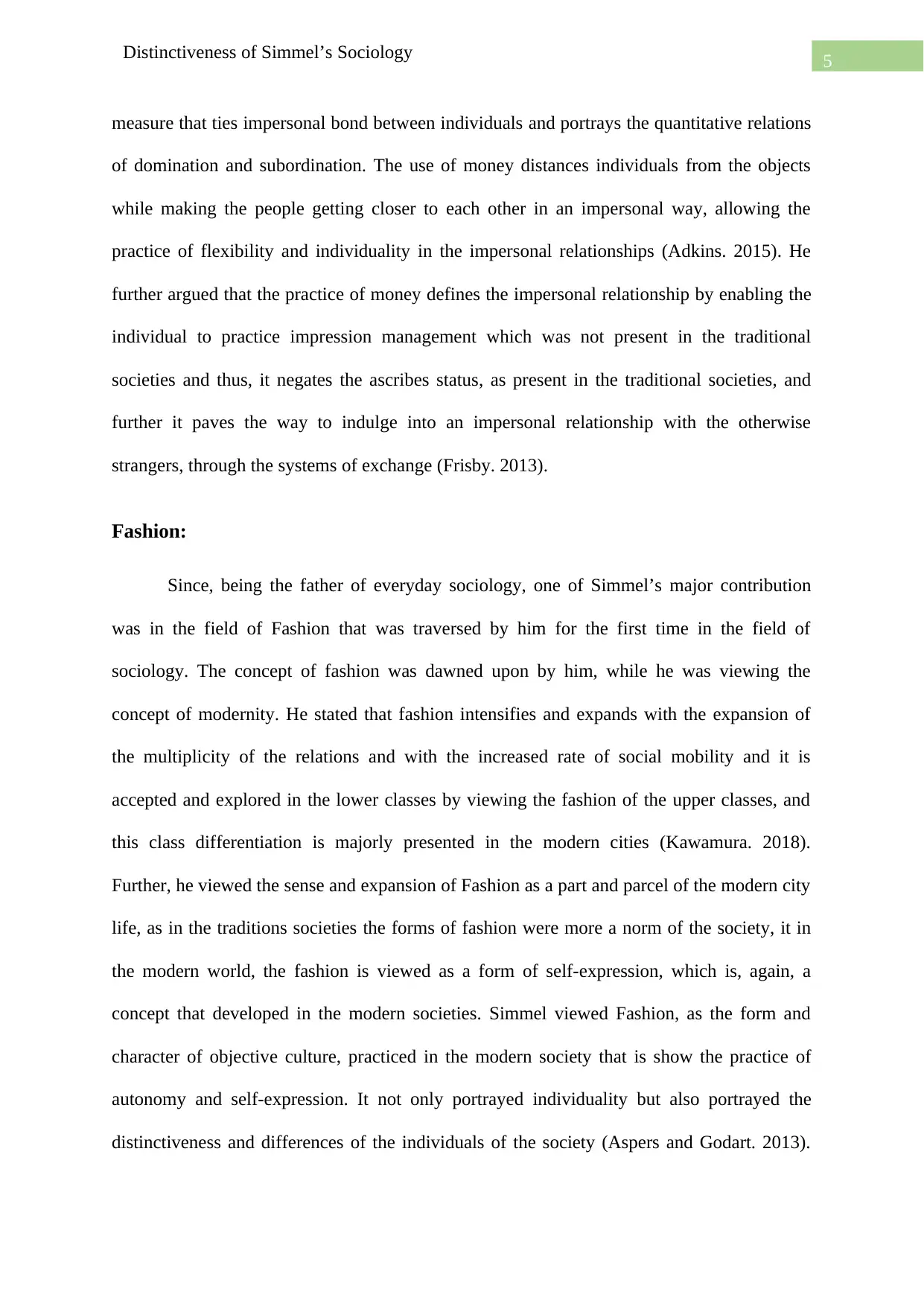
5Distinctiveness of Simmel’s Sociology
measure that ties impersonal bond between individuals and portrays the quantitative relations
of domination and subordination. The use of money distances individuals from the objects
while making the people getting closer to each other in an impersonal way, allowing the
practice of flexibility and individuality in the impersonal relationships (Adkins. 2015). He
further argued that the practice of money defines the impersonal relationship by enabling the
individual to practice impression management which was not present in the traditional
societies and thus, it negates the ascribes status, as present in the traditional societies, and
further it paves the way to indulge into an impersonal relationship with the otherwise
strangers, through the systems of exchange (Frisby. 2013).
Fashion:
Since, being the father of everyday sociology, one of Simmel’s major contribution
was in the field of Fashion that was traversed by him for the first time in the field of
sociology. The concept of fashion was dawned upon by him, while he was viewing the
concept of modernity. He stated that fashion intensifies and expands with the expansion of
the multiplicity of the relations and with the increased rate of social mobility and it is
accepted and explored in the lower classes by viewing the fashion of the upper classes, and
this class differentiation is majorly presented in the modern cities (Kawamura. 2018).
Further, he viewed the sense and expansion of Fashion as a part and parcel of the modern city
life, as in the traditions societies the forms of fashion were more a norm of the society, it in
the modern world, the fashion is viewed as a form of self-expression, which is, again, a
concept that developed in the modern societies. Simmel viewed Fashion, as the form and
character of objective culture, practiced in the modern society that is show the practice of
autonomy and self-expression. It not only portrayed individuality but also portrayed the
distinctiveness and differences of the individuals of the society (Aspers and Godart. 2013).
measure that ties impersonal bond between individuals and portrays the quantitative relations
of domination and subordination. The use of money distances individuals from the objects
while making the people getting closer to each other in an impersonal way, allowing the
practice of flexibility and individuality in the impersonal relationships (Adkins. 2015). He
further argued that the practice of money defines the impersonal relationship by enabling the
individual to practice impression management which was not present in the traditional
societies and thus, it negates the ascribes status, as present in the traditional societies, and
further it paves the way to indulge into an impersonal relationship with the otherwise
strangers, through the systems of exchange (Frisby. 2013).
Fashion:
Since, being the father of everyday sociology, one of Simmel’s major contribution
was in the field of Fashion that was traversed by him for the first time in the field of
sociology. The concept of fashion was dawned upon by him, while he was viewing the
concept of modernity. He stated that fashion intensifies and expands with the expansion of
the multiplicity of the relations and with the increased rate of social mobility and it is
accepted and explored in the lower classes by viewing the fashion of the upper classes, and
this class differentiation is majorly presented in the modern cities (Kawamura. 2018).
Further, he viewed the sense and expansion of Fashion as a part and parcel of the modern city
life, as in the traditions societies the forms of fashion were more a norm of the society, it in
the modern world, the fashion is viewed as a form of self-expression, which is, again, a
concept that developed in the modern societies. Simmel viewed Fashion, as the form and
character of objective culture, practiced in the modern society that is show the practice of
autonomy and self-expression. It not only portrayed individuality but also portrayed the
distinctiveness and differences of the individuals of the society (Aspers and Godart. 2013).
⊘ This is a preview!⊘
Do you want full access?
Subscribe today to unlock all pages.

Trusted by 1+ million students worldwide
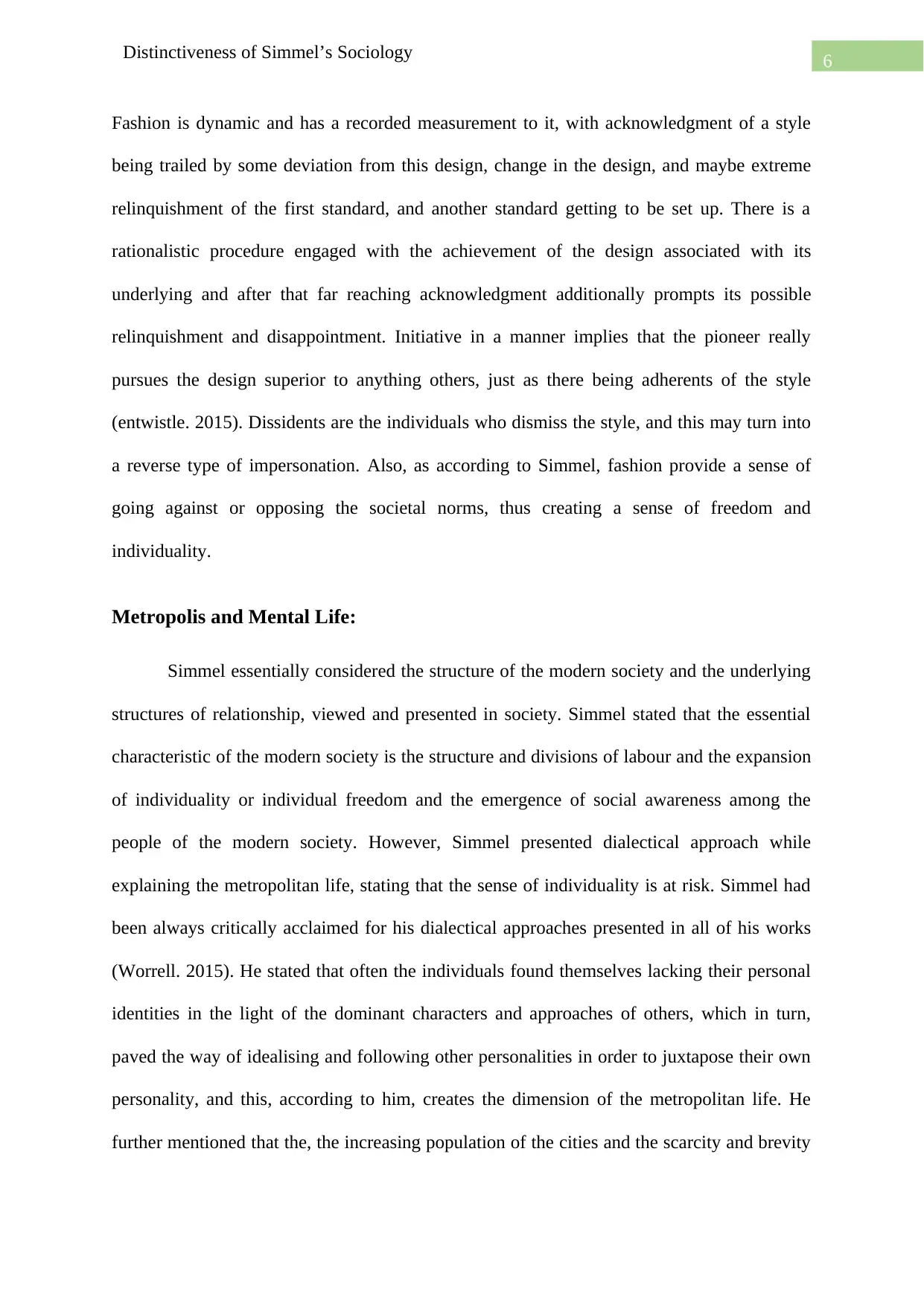
6Distinctiveness of Simmel’s Sociology
Fashion is dynamic and has a recorded measurement to it, with acknowledgment of a style
being trailed by some deviation from this design, change in the design, and maybe extreme
relinquishment of the first standard, and another standard getting to be set up. There is a
rationalistic procedure engaged with the achievement of the design associated with its
underlying and after that far reaching acknowledgment additionally prompts its possible
relinquishment and disappointment. Initiative in a manner implies that the pioneer really
pursues the design superior to anything others, just as there being adherents of the style
(entwistle. 2015). Dissidents are the individuals who dismiss the style, and this may turn into
a reverse type of impersonation. Also, as according to Simmel, fashion provide a sense of
going against or opposing the societal norms, thus creating a sense of freedom and
individuality.
Metropolis and Mental Life:
Simmel essentially considered the structure of the modern society and the underlying
structures of relationship, viewed and presented in society. Simmel stated that the essential
characteristic of the modern society is the structure and divisions of labour and the expansion
of individuality or individual freedom and the emergence of social awareness among the
people of the modern society. However, Simmel presented dialectical approach while
explaining the metropolitan life, stating that the sense of individuality is at risk. Simmel had
been always critically acclaimed for his dialectical approaches presented in all of his works
(Worrell. 2015). He stated that often the individuals found themselves lacking their personal
identities in the light of the dominant characters and approaches of others, which in turn,
paved the way of idealising and following other personalities in order to juxtapose their own
personality, and this, according to him, creates the dimension of the metropolitan life. He
further mentioned that the, the increasing population of the cities and the scarcity and brevity
Fashion is dynamic and has a recorded measurement to it, with acknowledgment of a style
being trailed by some deviation from this design, change in the design, and maybe extreme
relinquishment of the first standard, and another standard getting to be set up. There is a
rationalistic procedure engaged with the achievement of the design associated with its
underlying and after that far reaching acknowledgment additionally prompts its possible
relinquishment and disappointment. Initiative in a manner implies that the pioneer really
pursues the design superior to anything others, just as there being adherents of the style
(entwistle. 2015). Dissidents are the individuals who dismiss the style, and this may turn into
a reverse type of impersonation. Also, as according to Simmel, fashion provide a sense of
going against or opposing the societal norms, thus creating a sense of freedom and
individuality.
Metropolis and Mental Life:
Simmel essentially considered the structure of the modern society and the underlying
structures of relationship, viewed and presented in society. Simmel stated that the essential
characteristic of the modern society is the structure and divisions of labour and the expansion
of individuality or individual freedom and the emergence of social awareness among the
people of the modern society. However, Simmel presented dialectical approach while
explaining the metropolitan life, stating that the sense of individuality is at risk. Simmel had
been always critically acclaimed for his dialectical approaches presented in all of his works
(Worrell. 2015). He stated that often the individuals found themselves lacking their personal
identities in the light of the dominant characters and approaches of others, which in turn,
paved the way of idealising and following other personalities in order to juxtapose their own
personality, and this, according to him, creates the dimension of the metropolitan life. He
further mentioned that the, the increasing population of the cities and the scarcity and brevity
Paraphrase This Document
Need a fresh take? Get an instant paraphrase of this document with our AI Paraphraser
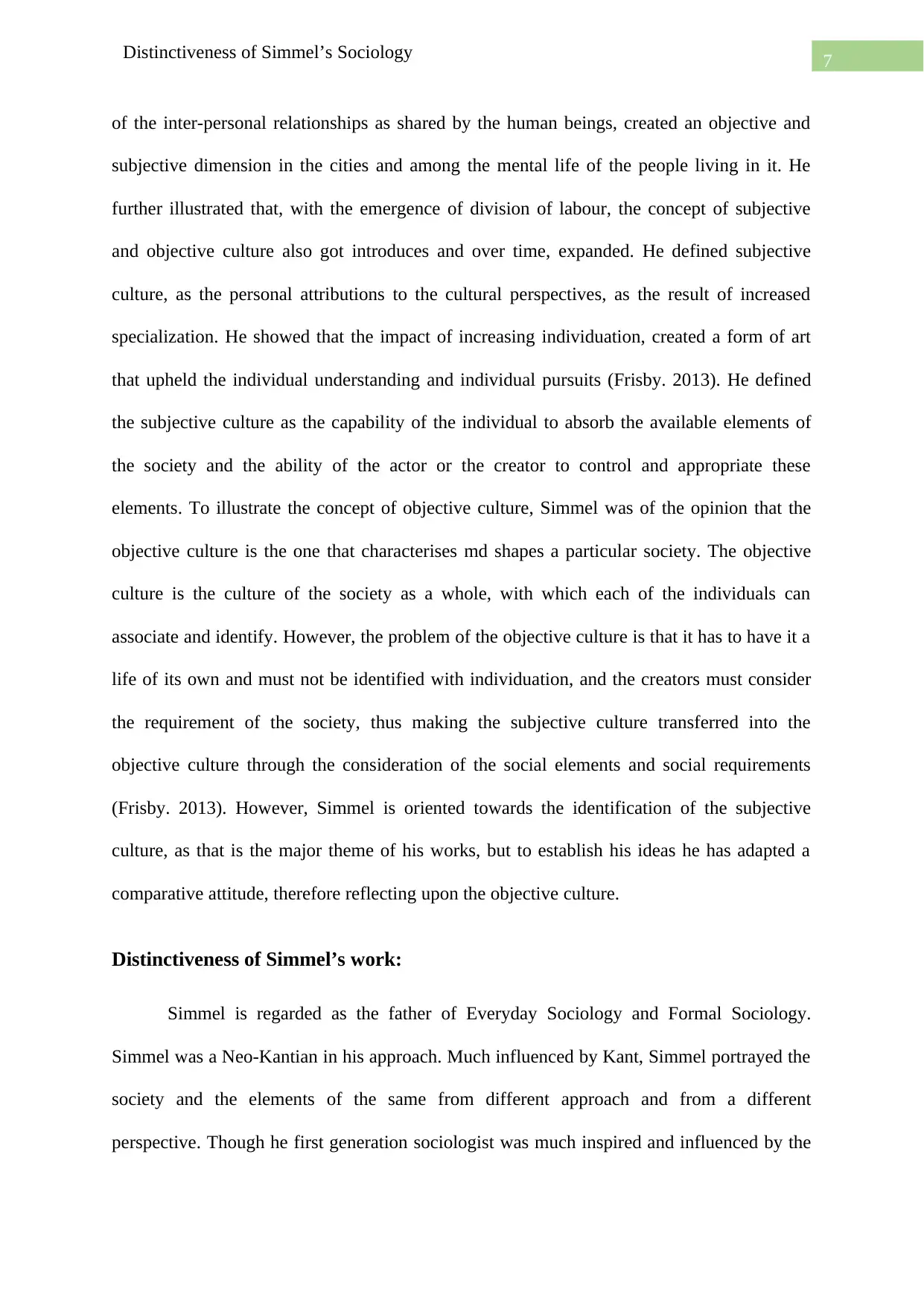
7Distinctiveness of Simmel’s Sociology
of the inter-personal relationships as shared by the human beings, created an objective and
subjective dimension in the cities and among the mental life of the people living in it. He
further illustrated that, with the emergence of division of labour, the concept of subjective
and objective culture also got introduces and over time, expanded. He defined subjective
culture, as the personal attributions to the cultural perspectives, as the result of increased
specialization. He showed that the impact of increasing individuation, created a form of art
that upheld the individual understanding and individual pursuits (Frisby. 2013). He defined
the subjective culture as the capability of the individual to absorb the available elements of
the society and the ability of the actor or the creator to control and appropriate these
elements. To illustrate the concept of objective culture, Simmel was of the opinion that the
objective culture is the one that characterises md shapes a particular society. The objective
culture is the culture of the society as a whole, with which each of the individuals can
associate and identify. However, the problem of the objective culture is that it has to have it a
life of its own and must not be identified with individuation, and the creators must consider
the requirement of the society, thus making the subjective culture transferred into the
objective culture through the consideration of the social elements and social requirements
(Frisby. 2013). However, Simmel is oriented towards the identification of the subjective
culture, as that is the major theme of his works, but to establish his ideas he has adapted a
comparative attitude, therefore reflecting upon the objective culture.
Distinctiveness of Simmel’s work:
Simmel is regarded as the father of Everyday Sociology and Formal Sociology.
Simmel was a Neo-Kantian in his approach. Much influenced by Kant, Simmel portrayed the
society and the elements of the same from different approach and from a different
perspective. Though he first generation sociologist was much inspired and influenced by the
of the inter-personal relationships as shared by the human beings, created an objective and
subjective dimension in the cities and among the mental life of the people living in it. He
further illustrated that, with the emergence of division of labour, the concept of subjective
and objective culture also got introduces and over time, expanded. He defined subjective
culture, as the personal attributions to the cultural perspectives, as the result of increased
specialization. He showed that the impact of increasing individuation, created a form of art
that upheld the individual understanding and individual pursuits (Frisby. 2013). He defined
the subjective culture as the capability of the individual to absorb the available elements of
the society and the ability of the actor or the creator to control and appropriate these
elements. To illustrate the concept of objective culture, Simmel was of the opinion that the
objective culture is the one that characterises md shapes a particular society. The objective
culture is the culture of the society as a whole, with which each of the individuals can
associate and identify. However, the problem of the objective culture is that it has to have it a
life of its own and must not be identified with individuation, and the creators must consider
the requirement of the society, thus making the subjective culture transferred into the
objective culture through the consideration of the social elements and social requirements
(Frisby. 2013). However, Simmel is oriented towards the identification of the subjective
culture, as that is the major theme of his works, but to establish his ideas he has adapted a
comparative attitude, therefore reflecting upon the objective culture.
Distinctiveness of Simmel’s work:
Simmel is regarded as the father of Everyday Sociology and Formal Sociology.
Simmel was a Neo-Kantian in his approach. Much influenced by Kant, Simmel portrayed the
society and the elements of the same from different approach and from a different
perspective. Though he first generation sociologist was much inspired and influenced by the
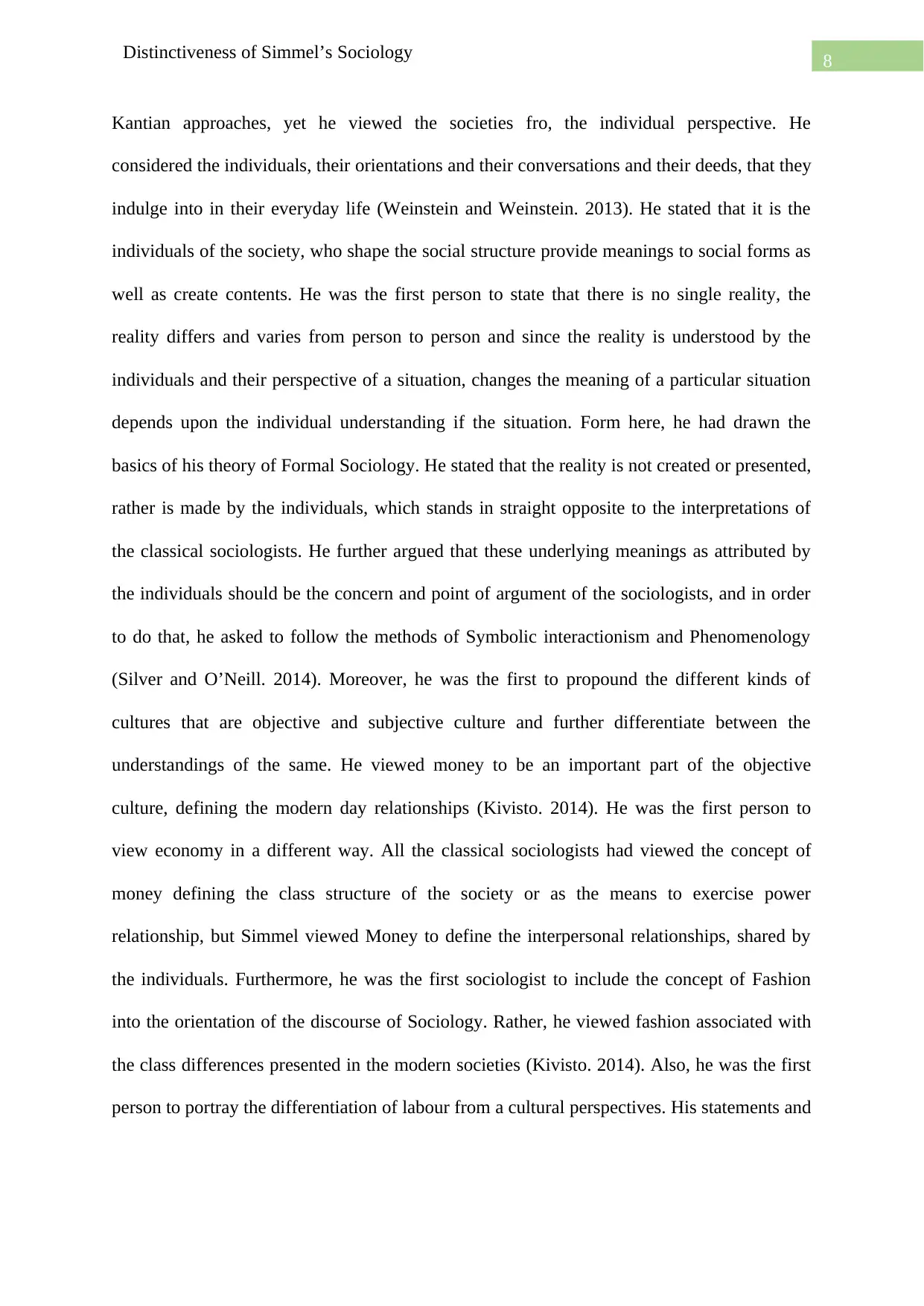
8Distinctiveness of Simmel’s Sociology
Kantian approaches, yet he viewed the societies fro, the individual perspective. He
considered the individuals, their orientations and their conversations and their deeds, that they
indulge into in their everyday life (Weinstein and Weinstein. 2013). He stated that it is the
individuals of the society, who shape the social structure provide meanings to social forms as
well as create contents. He was the first person to state that there is no single reality, the
reality differs and varies from person to person and since the reality is understood by the
individuals and their perspective of a situation, changes the meaning of a particular situation
depends upon the individual understanding if the situation. Form here, he had drawn the
basics of his theory of Formal Sociology. He stated that the reality is not created or presented,
rather is made by the individuals, which stands in straight opposite to the interpretations of
the classical sociologists. He further argued that these underlying meanings as attributed by
the individuals should be the concern and point of argument of the sociologists, and in order
to do that, he asked to follow the methods of Symbolic interactionism and Phenomenology
(Silver and O’Neill. 2014). Moreover, he was the first to propound the different kinds of
cultures that are objective and subjective culture and further differentiate between the
understandings of the same. He viewed money to be an important part of the objective
culture, defining the modern day relationships (Kivisto. 2014). He was the first person to
view economy in a different way. All the classical sociologists had viewed the concept of
money defining the class structure of the society or as the means to exercise power
relationship, but Simmel viewed Money to define the interpersonal relationships, shared by
the individuals. Furthermore, he was the first sociologist to include the concept of Fashion
into the orientation of the discourse of Sociology. Rather, he viewed fashion associated with
the class differences presented in the modern societies (Kivisto. 2014). Also, he was the first
person to portray the differentiation of labour from a cultural perspectives. His statements and
Kantian approaches, yet he viewed the societies fro, the individual perspective. He
considered the individuals, their orientations and their conversations and their deeds, that they
indulge into in their everyday life (Weinstein and Weinstein. 2013). He stated that it is the
individuals of the society, who shape the social structure provide meanings to social forms as
well as create contents. He was the first person to state that there is no single reality, the
reality differs and varies from person to person and since the reality is understood by the
individuals and their perspective of a situation, changes the meaning of a particular situation
depends upon the individual understanding if the situation. Form here, he had drawn the
basics of his theory of Formal Sociology. He stated that the reality is not created or presented,
rather is made by the individuals, which stands in straight opposite to the interpretations of
the classical sociologists. He further argued that these underlying meanings as attributed by
the individuals should be the concern and point of argument of the sociologists, and in order
to do that, he asked to follow the methods of Symbolic interactionism and Phenomenology
(Silver and O’Neill. 2014). Moreover, he was the first to propound the different kinds of
cultures that are objective and subjective culture and further differentiate between the
understandings of the same. He viewed money to be an important part of the objective
culture, defining the modern day relationships (Kivisto. 2014). He was the first person to
view economy in a different way. All the classical sociologists had viewed the concept of
money defining the class structure of the society or as the means to exercise power
relationship, but Simmel viewed Money to define the interpersonal relationships, shared by
the individuals. Furthermore, he was the first sociologist to include the concept of Fashion
into the orientation of the discourse of Sociology. Rather, he viewed fashion associated with
the class differences presented in the modern societies (Kivisto. 2014). Also, he was the first
person to portray the differentiation of labour from a cultural perspectives. His statements and
⊘ This is a preview!⊘
Do you want full access?
Subscribe today to unlock all pages.

Trusted by 1+ million students worldwide
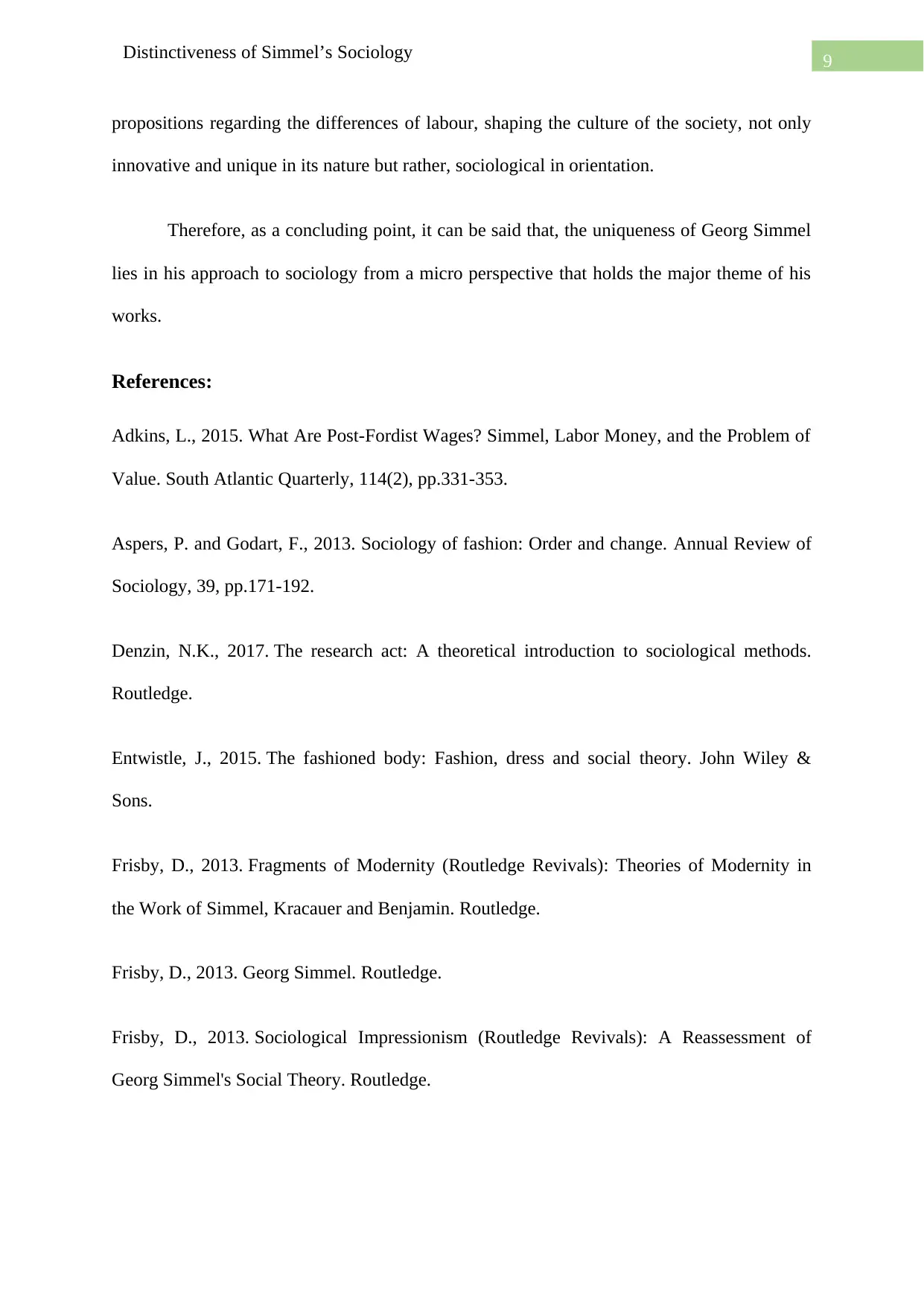
9Distinctiveness of Simmel’s Sociology
propositions regarding the differences of labour, shaping the culture of the society, not only
innovative and unique in its nature but rather, sociological in orientation.
Therefore, as a concluding point, it can be said that, the uniqueness of Georg Simmel
lies in his approach to sociology from a micro perspective that holds the major theme of his
works.
References:
Adkins, L., 2015. What Are Post-Fordist Wages? Simmel, Labor Money, and the Problem of
Value. South Atlantic Quarterly, 114(2), pp.331-353.
Aspers, P. and Godart, F., 2013. Sociology of fashion: Order and change. Annual Review of
Sociology, 39, pp.171-192.
Denzin, N.K., 2017. The research act: A theoretical introduction to sociological methods.
Routledge.
Entwistle, J., 2015. The fashioned body: Fashion, dress and social theory. John Wiley &
Sons.
Frisby, D., 2013. Fragments of Modernity (Routledge Revivals): Theories of Modernity in
the Work of Simmel, Kracauer and Benjamin. Routledge.
Frisby, D., 2013. Georg Simmel. Routledge.
Frisby, D., 2013. Sociological Impressionism (Routledge Revivals): A Reassessment of
Georg Simmel's Social Theory. Routledge.
propositions regarding the differences of labour, shaping the culture of the society, not only
innovative and unique in its nature but rather, sociological in orientation.
Therefore, as a concluding point, it can be said that, the uniqueness of Georg Simmel
lies in his approach to sociology from a micro perspective that holds the major theme of his
works.
References:
Adkins, L., 2015. What Are Post-Fordist Wages? Simmel, Labor Money, and the Problem of
Value. South Atlantic Quarterly, 114(2), pp.331-353.
Aspers, P. and Godart, F., 2013. Sociology of fashion: Order and change. Annual Review of
Sociology, 39, pp.171-192.
Denzin, N.K., 2017. The research act: A theoretical introduction to sociological methods.
Routledge.
Entwistle, J., 2015. The fashioned body: Fashion, dress and social theory. John Wiley &
Sons.
Frisby, D., 2013. Fragments of Modernity (Routledge Revivals): Theories of Modernity in
the Work of Simmel, Kracauer and Benjamin. Routledge.
Frisby, D., 2013. Georg Simmel. Routledge.
Frisby, D., 2013. Sociological Impressionism (Routledge Revivals): A Reassessment of
Georg Simmel's Social Theory. Routledge.
Paraphrase This Document
Need a fresh take? Get an instant paraphrase of this document with our AI Paraphraser
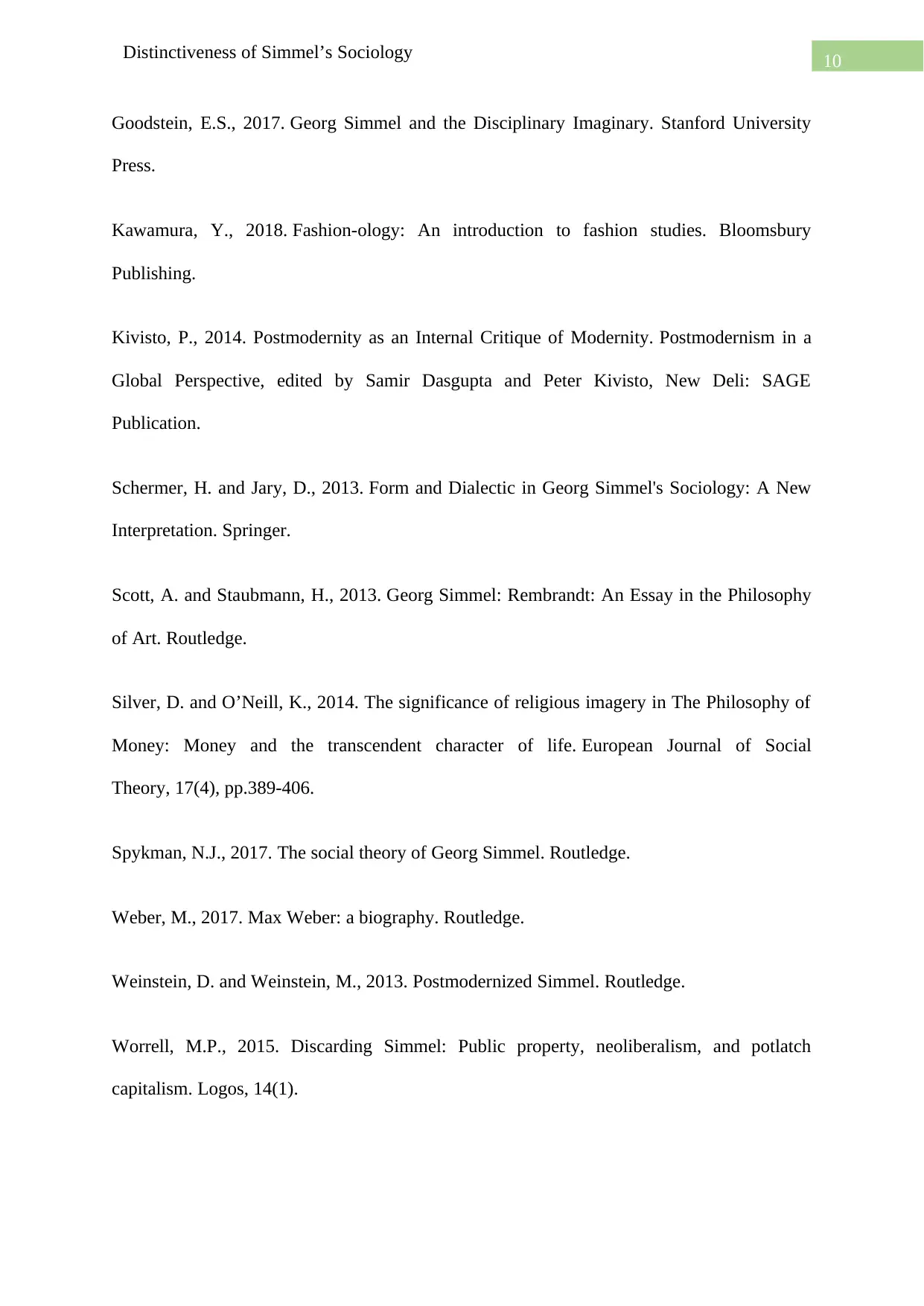
10Distinctiveness of Simmel’s Sociology
Goodstein, E.S., 2017. Georg Simmel and the Disciplinary Imaginary. Stanford University
Press.
Kawamura, Y., 2018. Fashion-ology: An introduction to fashion studies. Bloomsbury
Publishing.
Kivisto, P., 2014. Postmodernity as an Internal Critique of Modernity. Postmodernism in a
Global Perspective, edited by Samir Dasgupta and Peter Kivisto, New Deli: SAGE
Publication.
Schermer, H. and Jary, D., 2013. Form and Dialectic in Georg Simmel's Sociology: A New
Interpretation. Springer.
Scott, A. and Staubmann, H., 2013. Georg Simmel: Rembrandt: An Essay in the Philosophy
of Art. Routledge.
Silver, D. and O’Neill, K., 2014. The significance of religious imagery in The Philosophy of
Money: Money and the transcendent character of life. European Journal of Social
Theory, 17(4), pp.389-406.
Spykman, N.J., 2017. The social theory of Georg Simmel. Routledge.
Weber, M., 2017. Max Weber: a biography. Routledge.
Weinstein, D. and Weinstein, M., 2013. Postmodernized Simmel. Routledge.
Worrell, M.P., 2015. Discarding Simmel: Public property, neoliberalism, and potlatch
capitalism. Logos, 14(1).
Goodstein, E.S., 2017. Georg Simmel and the Disciplinary Imaginary. Stanford University
Press.
Kawamura, Y., 2018. Fashion-ology: An introduction to fashion studies. Bloomsbury
Publishing.
Kivisto, P., 2014. Postmodernity as an Internal Critique of Modernity. Postmodernism in a
Global Perspective, edited by Samir Dasgupta and Peter Kivisto, New Deli: SAGE
Publication.
Schermer, H. and Jary, D., 2013. Form and Dialectic in Georg Simmel's Sociology: A New
Interpretation. Springer.
Scott, A. and Staubmann, H., 2013. Georg Simmel: Rembrandt: An Essay in the Philosophy
of Art. Routledge.
Silver, D. and O’Neill, K., 2014. The significance of religious imagery in The Philosophy of
Money: Money and the transcendent character of life. European Journal of Social
Theory, 17(4), pp.389-406.
Spykman, N.J., 2017. The social theory of Georg Simmel. Routledge.
Weber, M., 2017. Max Weber: a biography. Routledge.
Weinstein, D. and Weinstein, M., 2013. Postmodernized Simmel. Routledge.
Worrell, M.P., 2015. Discarding Simmel: Public property, neoliberalism, and potlatch
capitalism. Logos, 14(1).
1 out of 11
Your All-in-One AI-Powered Toolkit for Academic Success.
+13062052269
info@desklib.com
Available 24*7 on WhatsApp / Email
![[object Object]](/_next/static/media/star-bottom.7253800d.svg)
Unlock your academic potential
Copyright © 2020–2026 A2Z Services. All Rights Reserved. Developed and managed by ZUCOL.


